It’s time to move away from albums, gigs and photos for a while and take a look at some of the music-themed books that have kept me sane on buses, trains and planes during 2015. By sheer chance, I’ve managed to pick out quite a nice variety of styles and themes, so the selection staggers from light-hearted memoirs through serious autobiography to high technology and serious crime (no, I don’t mean the new Coldplay album). So, as ever, in no particular order, here we go.
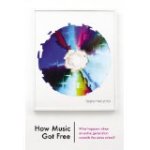 “How Music Got Free” – Stephen Witt
“How Music Got Free” – Stephen Witt
There’s a myth that’s been perpetuated about the origins of the current situation where we have a generation that won’t pay for music and a generation that doesn’t even recognise the concept of paying for music. What Stephen Witt’s book achieves is a comprehensive demolition of the myth that file-sharing came about because of some sort of people’s revolution where millions of like-minded people decided to share their digital music collections. This well-researched work picks out the various converging paths ultimately leading to the digital devaluation of music. The book explores the bureaucracy that bedevilled the adoption of a standard compression algorithm, the greed of the major music labels as they rushed into the highly lucrative CD market, the failure of the majors to react to the phenomenon of file compression (and increasing online transfer speeds which made sharing a viable proposition) and the outright criminality involved in stealing and counterfeiting masters from CD pressing plants. It’s a fascinating but ultimately depressing book.
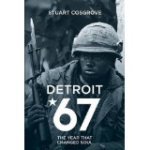 “Detroit 67: The Year that Changed Soul” – Stuart Cosgrove
“Detroit 67: The Year that Changed Soul” – Stuart Cosgrove
Stuart Cosgrove has picked out a pivotal year in the history of Motown and imposed a structure of a chapter per month (it works pretty well) which sets the upheavals at Motown against a backdrop of riots in Detriot, unrest in the police force and a general national malaise. Berry Gordy plays a central role in the well-known story of Diana Ross’s advancement at the expense of the other Supremes (and the expulsion of Florence Ballard), but Stuart Cosgrove delves deeper into the sickness at the heart of the company, dealing with the unease of major artists and the ultimate defection of the Holland/Dozier/Holland writing/production team. The book goes far beyond music biography by showing these events in the context of a city in meltdown with riots on either side of the racial divide and a brutal, corrupt police force fanning the flames. It’s a fascinating read, although there are far too many typos in the Kindle edition.
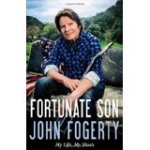 “Fortunate Son” – John Fogerty
“Fortunate Son” – John Fogerty
Confession time: the first song I performed in public was Creedence’s “Up Around the Bend” in a school band which included some good musicians and a future nuclear physicist, and me. I was a fan from an early age. “Fortunate Son” is John Fogerty’s attempt to put the record straight after accusations and counter-accusations, suits and counter-suits with his former band members Doug Clifford and Stu Cook. The book is unflinchingly honest throughout; John Fogerty isn’t trying a whitewash here. He owns up to his mistakes and errors of judgement and this gives him the right to expose others’ lies and hypocrisy. It’s difficult not to empathise with him in his battles with Saul Zaentz and the former Creedence members: he wrote the songs, after all. “Fortunate Son” pivots around John Fogerty’s meeting with his second wife, Julie, who brought order to his chaotic life and pushed him back towards popular and critical recognition. It’s good, it’s honest, it’s straightforward and it’s delivered in an authentic John Fogerty voice.
 “Unfaithful Music and Disappearing Ink” – Elvis Costello
“Unfaithful Music and Disappearing Ink” – Elvis Costello
Declan McManus has an awful lot of stories to tell and, not surprisingly, he has a gift for writing and storytelling. “Unfaithful Music…” is a cracking read, giving an insight into the creation of some wonderful music, and life in the music business bubble. The book doesn’t follow a straightforward chronological structure; it’s much more like a conversation in the pub with each observation triggering another digression. There are some difficult events to deal with (the Stephen Stills/Ray Charles incident for example) and they’re all dealt with in a very matter of fact way. The book skips over some big chunks of Elvis Costello’s life, but the ones he does tackle are done with honesty and candour. The names that crop up as the story unfolds are a history of popular music, but this never feels like name-dropping, they’re just people who happen to have been around at certain times. This is a wonderful book.
“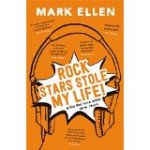 Rock Stars Stole My Life” – Mark Ellen
Rock Stars Stole My Life” – Mark Ellen
Mark Ellen’s memoir is a breezy and self-deprecating run through a life as a pop journalist, radio presenter, TV presenter and publisher. He gives an inside view on life at the NME in the seventies, The Old Grey Whistle Test and the Live Aid broadcast, all delivered in a jaunty style that’s very easy to read. He’s met and worked with some amazing people (again, it’s all matter-of-fact rather than name-dropping), but being a member of Ugly Rumours with Tony Blair takes some beating. Most of the book is fairly gentle humour, smiles rather than guffaws, but Mark Ellen saved the best for last. His account of the mayhem aboard Rihanna’s ill-conceived and farcical round-the-world-in-seven-days tour made me laugh out loud. The entire book’s funny, but this piece was hilarious.
If you don’t see anything you fancy there, Chrissie Hynde’s “Reckless” and Bob Harris’s “Still Whispering After All These Years” are both well-written and interesting biographies.
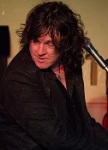 We’re big fans of Bob Malone here at MusicRiot so when I got the chance to meet up for a chat on the final night of his UK tour it was a bit of a no-brainer. Bob’s been in the UK for three weeks touring in support of his “Mojo Deluxe” album and the “Mojo Live” DVD and The 100 Club gig was the climax of a hectic tour schedule. So a very noisy 100 Club dressing room is where we got the chance to talk about old pianos, New Orleans and Southside Johnny, among other things:
We’re big fans of Bob Malone here at MusicRiot so when I got the chance to meet up for a chat on the final night of his UK tour it was a bit of a no-brainer. Bob’s been in the UK for three weeks touring in support of his “Mojo Deluxe” album and the “Mojo Live” DVD and The 100 Club gig was the climax of a hectic tour schedule. So a very noisy 100 Club dressing room is where we got the chance to talk about old pianos, New Orleans and Southside Johnny, among other things:
Allan – So it’s approaching the end of the tour and we met on the first night in Southend. How has it been since then?
Bob – It’s been great; a few funky gigs, a few spectacular gigs and we’ve worked hard. We had a couple of nights where we didn’t have gigs but we still had a radio show or a long drive; we’re a hard-working group.
Allan –Have you had any particularly good gigs?
Bob – This one’s definitely gonna be a good one and Keighley Blues Club, that was a really great crowd and Scotland as well, and we also played on the Isle of Wight.
Allan – I remember when we met in Southend you were talking about Italian audiences.
Bob – They’re full on, right out of the box, from the first song.
Allan –Do you notice any differences in the audiences around the UK?
Bob – Well it sometimes takes three or four songs here. The north is different from the south, as you know. I didn’t until I did these long tours here; England was just England like people think America is just America but here it’s five different countries with completely different cultures.
Allan – Have you played The 100 Club before?
Bob – No, but its reputation precedes…
Allan – How does that feel?
Bob – It feels good. I was soundchecking with the grand piano earlier and the sound engineer had footage of Paul McCartney playing that same piano.
Allan – I think it’s great to see it with the lights up and look at all those great photos around the walls of the people that have played here in the past.
Bob – I love places with history like this; you feel like you’re part of a continuum.
Allan – You’re promoting the Mojo Deluxe album at the moment. What kind of a reception has the album had?
Bob – I think it’s the most press and radio I’ve had on anything I’ve done and it’s my twentieth year of making records, so I’m happy with that.
Allan – After doing what I think of as the day job with John Fogerty, how does this compare? It must be a huge culture change.
Bob – It’s different. I’ve been doing this for twenty-five years; this is what I do, and I’ve been playing with John for almost five years now. With this, so long as the sound man is competent I’m happy. Everyone thinks it must be weird to go from small crowds to big crowds, but it really isn’t. As long as it’s a good musical experience and you’re connecting with an audience; that’s why we play. You can’t really control the size of the crowd and also when I do this it’s a mission; when I play with John it’s his gig. I’m lucky to be there but it’s his gig. I get my solo but other than that, it’s all about him and I’m just in the background.
Allan – Trying to avoid the pyrotechnics…
Bob – Trying not to burst into flames during “Fortunate Son”, exactly.
Allan – So when you’re out doing your own stuff, here and in the States, what would be your ideal band line-up?
Bob – The ultimate, when I’m not touring; when I’m LA, and I don’t have to put people in hotel rooms would be a nine-piece band. I just did a DVD, which I did the way I would like to do it and I had three female background singers, percussionist, drums, bass and guitar. I do a lot of stuff with horns as well, for years I had a horn section, so it would be a nine to eleven piece band and a second keyboard player would be great, to play the organ parts. (If you’re really paying attention, you’ll notice that the total number of musicians is only eight, but there’s a slide guitar player on there as well. I hope your heart isn’t broken by that omission Marty Rifkin.)
Allan – On your own tours, particularly in the UK, you rely on the venue providing the piano. Have you had any horror stories with that in the past?
Bob – Well, usually I carry a digital piano for when there’s no real alternative, but most of the places I play now, if there is a real piano, it’s usually in good shape, but I’ve been to places that had a hundred year old upright and some of the keys didn’t work but I kind of like to play those anyway, just for the challenge. It’s like going in the ring with this old piano and fighting it to see who wins. I love real pianos because they all have personality; the digital ones are handy and they’re light and they don’t go out of tune, but they don’t have much of a personality. They get the job done.
The one in Southend, that’s got some issues. It’s got some broken strings; it’s one that I fight to the death but I like playing it because it’s an old Bösendorfer.
Allan – I did notice a few problems at the soundcheck that night…
Bob – It needs a rebuild, but still I’m glad to see it.
Allan – You’re classically and jazz trained; was there any one thing that turned you into a rock/blues pianist?
Bob – The rock thing came first. One of those things was hearing “Sergeant Pepper” for the first time, so it’s you guys, it’s your fault. Then I heard Billy Joel and Elton John and not very long after that the New Orleans thing, which blew me away, and then Ray Charles and I became a huge student of that stuff but the rock stuff was always there.
Allan – Were you singing right from the start?
Bob – I started singing when I was fifteen probably. I started singing because I wanted to impress a girl I had a crush on. I just played classical piano but “Your Song” by Elton John was the first thing I ever sang in public; I thought ‘She’ll love me if I sing this song’. I was a terrible singer, some people still say I am, but I learned to work with what I have.
You write songs and there are obviously lots of people with better voices than me but when you write songs you have a story to tell and people always respond to the story and sometimes you’re the only person that can tell it.
Allan – We’ve had “Mojo Deluxe” this year, so what’s next on the agenda.
Bob – Well, I’ve got this DVD coming out and the audio from that was so good, we’re thinking of putting that out as a live record next year and I’ll make another new record, so I’ll probably get the live one out next year and in 2017 I’ll have a new studio album. I’ve got to get realistic about this; I’ve got about half the songs I need for another record.
Allan – I interviewed Southside Johnny in July 2014 in London…
Bob – Southside Johnny was also one of the big things in my youth and I should mention this because growing up in New Jersey, we all knew Southside Johnny. This was the 80s and you couldn’t hear that kind of music on the radio at all and so my first real exposure to r’n’b, blues, horn section kinda music was Southside and I learned from that and went back and figured out all the other stuff. He was huge for me.
Allan – When I interviewed him at Shepherds Bush Empire last July, we spoke about his new album “Soultime!” and he said they were aiming to get it out for Christmas 2014 and that finally came out in August this year.
Bob – Yeah, that’s about right. I toured here last year and I had half of “Mojo Deluxe” out as “Mojo EP”. We had finished recording and it was half-mixed and there were some problems and we couldn’t get the other half mixed in time and the promoter said ‘The whole thing is you have a record out for this tour; we can’t get any press without a record’ so we had half a record out as an EP, just in the UK for the tour.
Allan – And that worked really well as a sampler for the album.
Bob – And by the end of last year the whole thing was done but then we needed a three month ramp for the release date to get it publicised and I was touring through the spring, so we just put the whole thing off and it came out almost a year later. That’s how it works. There are so many factors; if you have a lot of money involved, you can get things done a lot quicker. On a limited budget, you still need time to publicise, so you often end up delaying.
Allan – One final question; do you have one song that tears you up and gets you really emotional?
Bob – Yeah, “One for my Baby”, the Sinatra song; that one kills me every time. It depends on the day; it could be something else on another day.
Allan – Thanks very much, Bob.
And there you go; a private audience with the great Bob Malone, who was as entertaining offstage as on. Since we spoke, I’ve had a chance to watch the “Mojo Live” DVD and it’s superb, capturing the magic of a one-off performance absolutely perfectly. It has great performances from all of the musicians and it’s a whole load of fun; keep an eye out for it.


